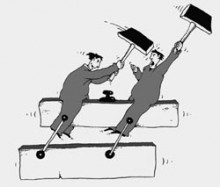The first few months of a new year are usually the time for ambitious planning. This year may prove a sad exception. Many experts are unanimous that the year 2003 will be far from favorable for the Ukrainian economy. However, Ukrainian politicians and businessmen try to keep an optimistic spirit.
The main difficulty here is that the Ukrainian government did not learn to control or predict economic growth. It reflects somewhat the situation on foreign markets, but other than that moves spontaneously.
In all probability, this year will see slower growth rates in the consumer goods market. A stricter fiscal policy and curbs on the shadow economy (through more transparency of financial operations, reduction of the volume of dubious transactions as a result of improvement and “unification” of Ukrainian legislation) will negatively affect the per capita income growth rate. By contrast, increasing the minimum wage in the present conditions could have a twofold effect. On the one hand, this would start another cycle of channeling resources for consumption, thanks to which consumers’ incomes will continue increasing for the short term. On the other hand, this will lead to a withdrawal of resources from the target of development both via the fiscal system (currently there is ongoing debate as to how additional budget receipts could be secured to increase salaries at enterprises funded out of the budget, but even now one can tell without fail from which expenditure items and fiscal sources these funds will come) and directly from the resources of companies which will also have to raise official salaries to the minimum level.
This told, even if consumer demand continues to grow on the domestic market, producers of consumer goods will be placed under increasingly greater strain as they find it more difficult to satisfy the ever-growing consumer demand. Retail companies, which have been burgeoning in recent years, will have no choice but to compensate the growing demand with imported goods.
In recent years the problem of a narrow domestic market was solved with greater exports. But judging from official forecasts, Ukrainian exporters are facing a hard future. Experts forecast dwindling demand for Ukrainian goods on the markets of Russia as a result of its lower capacity to pay resulting from the drop in oil prices in the world. The dwindling demand for ferrous metals, which account for a major share in Ukraine’s export, may also aggravate the situation. Periodical scandals on the world arms market involving Ukraine could cost Ukraine its reputation in this sphere.
In all probability, all of the above was the reason behind the forecast published last year by the Ministry for the Economy, according to which exports would be up a mere 1% in 2003. Be that as it may, such a prognosis seems all too pessimistic. Growing commodity turnover with the Russian Federation in the second half of 2002, developing industrial cooperation, and growing production of export goods are graphic evidence of a more favorable outlook. However, last year’s buoyant agricultural export volumes can hardly be achieved this year. The effects of unfavorable weather conditions cannot be countered with cash infusions neither by agrarian enterprises nor the state. The prospects for the development of export to the Russian Federation should be sought in the sphere of trade in spare parts, production of the machine building industry, and ready-made products of the food industry.
However, possible export successes are not an undisputedly positive factor. It is not ruled out, though, that in this sphere Ukraine may face a scenario in which the growth ensured by sectors working for export will not stimulate the government to effect structural transformations in the national economy and look for internal factors of economic development.
In turn, a drop in the positive balance of current operations owing to increasing import and dwindling export can lead to the depletion of such an important channel of money supply in the national economy as the reserves of the National Bank. Should the government and NBU fail to find ways to substantially increase the crediting of the real sector of the economy, this will aggravate the problem of deficit of liquid funds still further and slow down the remonetization of the economy. The high price of credit resources will remain unchanged. In part, illustrative is the fact that late last year the cabinet downscaled the official inflation target for 2003 from 6-7 to 4%. Tellingly, this year the government is going to put tighter controls on the money supply and will not demand that the new NBU leadership take measures capable of slackening monetary stability. The country needs a “budget of development” and EBRD loans have not gone beyond their declared positions.
The fulfillment of budget 2003, whose receipts should in fact exceed 16% of last year’s actual revenue, will be possible only through tightening tax screws on the businesses. Thus it is hard to disagree with analysts who view cadre appointments in the higher echelons of the tax administration as a means of consolidating the fiscal power in the country and a sign of a sharp increase in the essentially punitive function of fiscal bodies. This may be an indication that tax dictatorship exhibiting a clearly selective nature will not change the business climate for the better. So far, the probability of such a scenario in conditions of the growing importance of the administrative resource is very high. For this very reason, the probability of effecting a broad-scale tax reform and adopting the Tax Code planned for the first half of this year is very low. In the light of this, the introduction of a new tax system that would ease the tax burden even in 2004 is quite unlikely. Its betterment in 2003 (save for various innovations aimed to increase the volume of tax receipts) is hardly possible.
Last year saw an acute crisis of economic policy, which, incidentally, was stressed in the presidential message to the parliament in May. As the experience has shown, the strategic targets of long-term growth, structural transformations, increasing the competitiveness of national producers, and ensuring the social orientation of the budget, can hardly be achieved using the common levers and instruments of a market economy. This explains the active involvement of administrative resource which will be used to solve the said crisis this year.
Such conditions prompt national companies to seek ways of “informal” communication with the bodies of power and they are not all that interested in investing into increasing their efficiency. This situation will continue unless the state and businesses form a joint development strategy. It should combine the potential of national entrepreneurship and a weighed, reasonable, and strategically oriented state policy aimed at stimulating economic growth.








